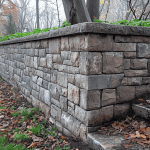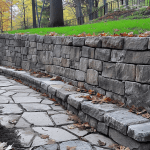
When it comes to landscaping and property management, retaining walls play a crucial role in preventing soil erosion, improving drainage, and enhancing outdoor aesthetics. Choosing the right type of retaining wall is essential for both functionality and longevity. Various factors such as soil type, landscape design, and aesthetic preferences must be considered. In this guide, we will explore the different types of retaining walls and how to choose the best one for your project.
Understanding Retaining Wall Types
The first step in selecting a retaining wall is understanding the different retaining wall types available. Each has its own advantages and is suited for specific conditions. Here are the most common types:
Gravity Retaining Walls
Gravity walls rely on their own weight to hold back the soil. Typically built from stone, concrete, or brick, these walls are suitable for smaller-scale projects and areas where deep excavation is not feasible. They are an excellent choice for homeowners looking for a durable yet aesthetically pleasing solution.
Cantilever Retaining Walls
Cantilever walls use a reinforced concrete base and leverage to resist soil pressure. These walls require proper engineering and are ideal for medium to large-scale applications. If you need a strong and cost-effective solution, cantilever walls offer excellent performance and durability.
Sheet Pile Retaining Walls
Commonly used in areas with loose or soft soil, sheet pile walls are made from steel, vinyl, or wood and driven deep into the ground. These walls are often used in waterfront properties or places where space is limited. If your project site is in an area with high moisture content, this could be the right retaining wall for you.
Anchored Retaining Walls
For areas that require additional reinforcement, anchored retaining walls use cables or rods driven into the soil for added support. These walls are beneficial in projects where high loads need to be retained, such as hillside properties or commercial landscapes.
Segmental Retaining Walls (SRW)
Segmental retaining walls are one of the most popular choices among Pittsburgh retaining wall contractors. Made from interlocking concrete blocks, these walls provide flexibility, durability, and aesthetic appeal. They work well in various landscapes, making them an excellent choice for homeowners looking to blend function with style.
Factors to Consider When Choosing a Retaining Wall
Once you understand the different retaining wall types, it’s time to determine which one best suits your project. Below are key factors to consider:
1. Soil Type
The soil condition at your project site greatly impacts the type of retaining wall you should choose. Clay-heavy soils expand and contract with moisture levels, requiring walls with strong reinforcement. Sandy soils, on the other hand, drain well but may need additional stabilization.
2. Drainage Requirements
Poor drainage is one of the primary reasons retaining walls fail. Choosing a wall with proper drainage solutions, such as weep holes or gravel backfill, can prevent water buildup and extend the life of your wall. If your property is in a high-rainfall area, retaining walls for rain are particularly crucial.
3. Aesthetic Preferences
Retaining walls do more than just hold back soil; they also enhance your landscape. From natural stone to modern concrete blocks, choosing a material that complements your outdoor environment is essential. Many Pittsburgh retaining wall builders offer various designs to match both traditional and contemporary aesthetics.
4. Budget Considerations
The cost of a retaining wall varies based on material, size, and complexity. Homeowners should compare retaining wall material choice options to balance affordability with durability. Calculating retaining wall costs upfront helps avoid unexpected expenses during construction.
5. Local Regulations and Permits
Before starting any project, check with local authorities regarding retaining wall permits in Pittsburgh. Regulations for retaining walls differ based on height and location, so ensuring compliance with Pittsburgh retaining wall rules is vital to avoid fines or delays.
Choosing the Right Retaining Wall Material
The materials used in retaining walls impact their durability and visual appeal. Some common choices include:
- Concrete Blocks – Durable and versatile, great for modern designs.
- Natural Stone – Offers a classic, elegant look but may be costlier.
- Brick – Provides a timeless aesthetic and strong structure.
- Wood – Affordable but requires regular maintenance to prevent rot.
- Gabion Walls – Metal cages filled with stones, offering a unique and environmentally friendly option.
Finding the Right Retaining Wall Contractor in Pittsburgh
Selecting a professional contractor is essential for a successful project. Experienced retaining wall installers in Pittsburgh ensure proper construction, compliance with regulations, and high-quality materials. When choosing a contractor, consider their experience, portfolio, and customer reviews.
Conclusion
Choosing the right type of retaining wall involves evaluating landscape needs, soil conditions, and personal preferences. Whether you need a gravity wall for a small garden or a cantilever wall for a large commercial property, Pittsburgh retaining wall contractors can guide you through the selection process. By understanding retaining wall differences and carefully planning your project, you can create a durable and visually appealing outdoor space that enhances both function and beauty.



